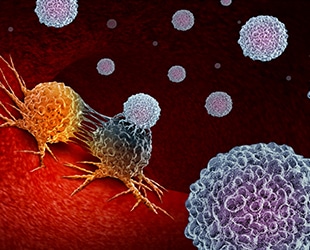Pre-surgical Immunotherapy May Improve Long-term Patient Survival
Patients with lung cancer who received an immune checkpoint inhibitor before surgery had improved long-term survival rates and lower rates of recurrence than historically observed, according to a study published in an AACR journal.

Lung cancer patients who were given the immunotherapeutic nivolumab before surgery were more likely than historical averages to survive for five years and avoid recurrence of the disease, according to long-term clinical trial results, which were published in Clinical Cancer Research, a journal of the American Association for Cancer Research.
Pre-surgical treatment intended to shrink the tumor is known as neoadjuvant therapy.
“The results from the five-year follow-up analysis indicate that neoadjuvant nivolumab was safe in long-term follow-up and led to encouraging survival in this patient cohort,” said the study’s senior author, Patrick Forde, MBBCh, an associate professor of oncology and director of the Thoracic Oncology Clinical Research Program at the Sidney Kimmel Comprehensive Cancer Center (SKCCC) at Johns Hopkins.
Among the 20 patients in the trial who underwent surgery, 12 patients (60 percent) remained recurrence-free five years after surgery, and 16 patients (80 percent) were alive, exceeding five-year survival rates ranging from 36 percent to 68 percent historically observed for patients with stage I-III non-small cell lung cancer, noted Samuel Rosner, MD, co-first author of the study, a medical oncology fellow at SKCCC and a member of Forde’s research group.
Forde added that the observed patient outcomes after neoadjuvant nivolumab were better than those historically observed among patients treated with neoadjuvant chemotherapy. “The long-term safety and efficacy data from this study provide further support for the use of nivolumab in the neoadjuvant setting,” he explained.
Nivolumab is a type of immunotherapy known as an immune checkpoint inhibitor that works by blocking the pro-tumor effects of the PD-1 and PD-L1 proteins. Nivolumab in combination with chemotherapy was approved as a neoadjuvant treatment for lung cancer by the U.S. Food and Drug Administration in March 2022.
Previously reported clinical trial results indicated that neoadjuvant nivolumab alone (without neoadjuvant chemotherapy) might benefit patients with stage I, II, or III non-small cell lung cancer, but long-term outcomes were unknown. The article published by Forde and colleagues provided the final analyses from the trial, which included five-year overall survival and recurrence-free survival rates.
“To our knowledge, this is the longest follow-up to date for a PD-1/PD-L1 inhibitor in the neoadjuvant setting for any solid tumor,” said Forde.
